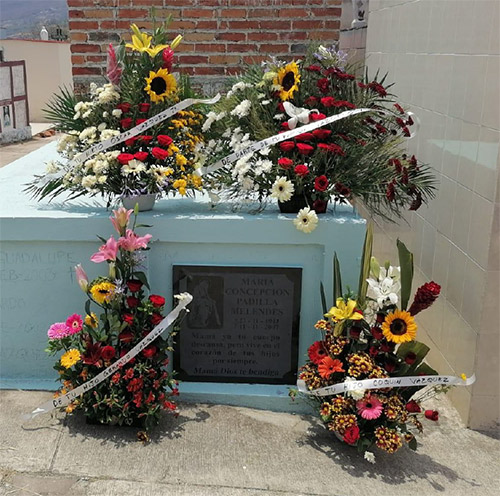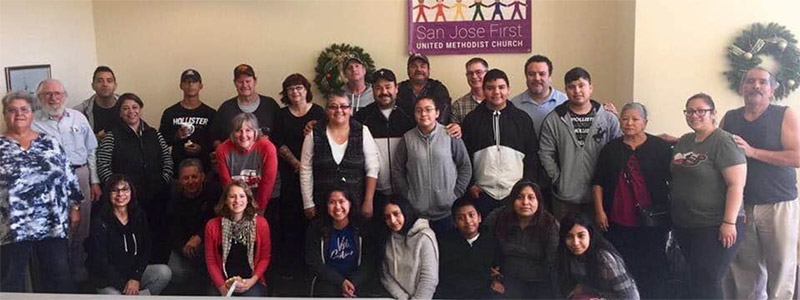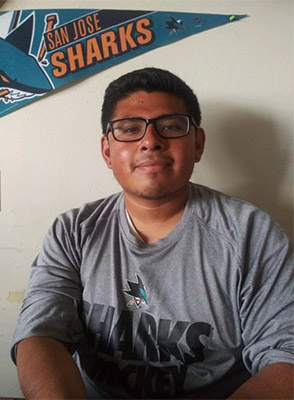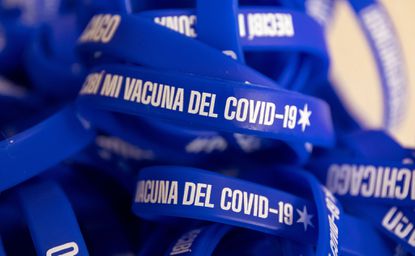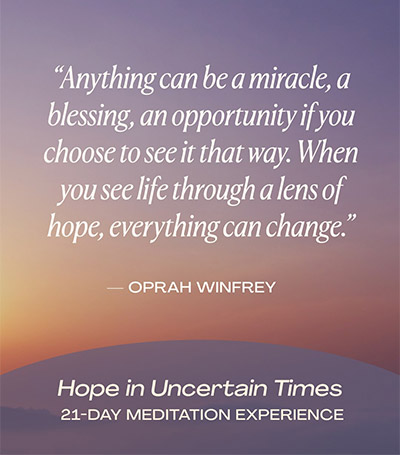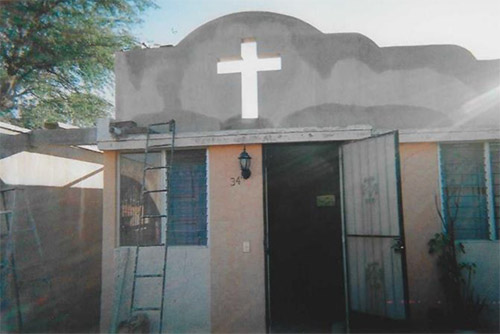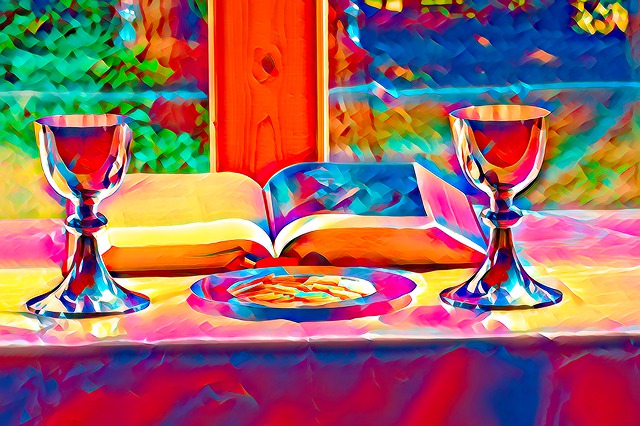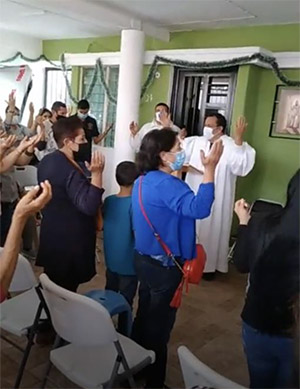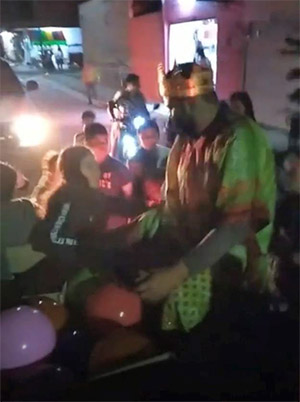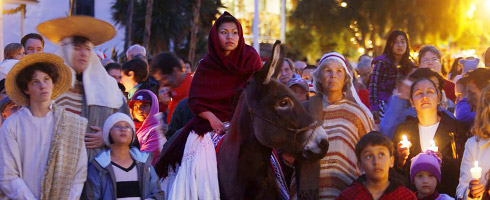Como es costumbre, cuando voy de vacaciones a México siempre quiero visitar el lugar donde nací, y la colonia donde hoy tengo mi casa, en el Infonavit Maguey ahí en Atotonilco El Alto Jalisco.
Muchos de ustedes ya conocen de mi vida y la triste realidad, mis dos únicos hijos murieron, mis padres y abuelos también, además mi divorcio. Me quede solo y sin sentido, lo que si me di cuenta es de que tengo mucho amor en mi corazón y al quedarme solo, no sabía cómo y a quien le entregaría este sentimiento tan hermoso que se llama amor.
Fue cuando decidí fundar mi pequeña Iglesia “Cristo Vive” para que la gente que sufrió y sufre como yo, nos reuniéramos para orar, unos por otros y yo buscaría la ayuda para mi comunidad de fe, con la ayuda y bendición de Dios. Y poder pasar el amor de Dios que está en mi corazón.
Yo tenía muchos sueños y muchos planes para mis hijos, que no se realizaron y me quede con ese anhelo, cuando regrese a mi colonia en el 2007, me puse en oración en el techo de mi casa a las 3:00 am con lagrimas en los ojos, de mirar hacia atrás, mi vida ya no tenia un futuro, mire las pequeñas casas humildes en mi colonia y le pedí a Dios guiarme, me sentía inútil para seguir viviendo, me fui a dormir.
Al siguiente día salí a la calle y mire a 6 niños con su carita sucia, sin zapatos y su cabello sucio por el polvo y la tierra que hay en la colonia, jugando con una pelota en la calle y mire en sus caritas sucias, sonrisas nobles, de esas que salen del corazón, me acerque a saludarlos y a invitarles un refresco de dos litros y unos panes, me dijeron gracias señor y yo les dije, gracias a Dios, mire como se los comían rápidamente, y me fui de ahí, a lo lejos voltee la mirada, y me miraban de lejos sonriendo, esa sonrisa era desde el cielo, era Dios que me sonreía y me contesto mi pregunta.
Ese día Dios me dio la misión de amar a la gente que me rodea como a mis propios hijos y padres, amarme a mi mismo, en la gente que sufre y llora como yo, a formar puentes entre otras culturas y romper las cadenas de la opresión que hay entre los más discriminados y marginados de cualquier cultura u origen.
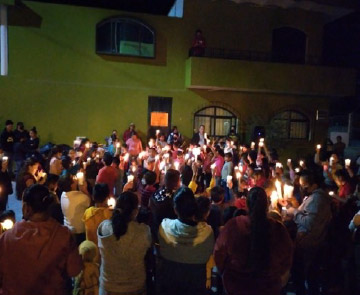
En la Iglesia Católica Romana, el día 02 de febrero se celebra el día de la Candelaria, y la tradición es llevar a los niños recién nacidos o pequeños al templo para que los presenten a Dios y el sacerdote los bendiga.
Yo pensé lo contrario, hice una convocatoria a través de la Iglesia Cristo Vive, los niños de 3 a 12 años de edad fueran con una vela o veladora a las 7:00 de la noche, y las encendieran para representar la luz de Dios en la comunidad y nosotros con algunas donaciones de personas de buen corazón, que hicieron para que les comprara un regalo, por ser ellos la luz de Dios en el mundo.
Para mí los niños menores de doce años viven en la inocencia, son puros de corazón, no tienen malicia, solo sueños. Los niños en las áreas pobres de cualquier parte del mundo solo piensan en comer, jugar a los super héroes, y sueñan con ser triunfadores, en ellos yo puedo mirar el amor de Dios.
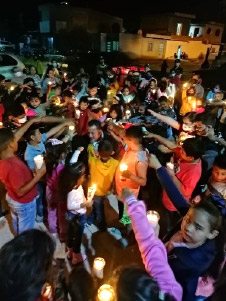
Esa noche del viernes 04 de febrero de 2022 yo desee que los niños que convocamos me bendijeran a mí, fueron registrados 230 niños, me puse de rodillas en medio de ellos e hicimos la oración para que Dios me bendijera y yo haga un buen trabajo en mi llamado y me libre de la corrupción, que cualquier actividad que yo realice sea para la honra y gloria de Dios, ya que Dios me quiere para que le sirva a El y todo el amor y atención que tenia planeado para mis hijos y familia se lo de a la comunidad donde quiera que yo me encuentre.
Para mí es un privilegio que estos niños me bendijeran, pude sentir el amor puro y verdadero de Dios en mi corazón, y recordé a los niños de hace 15 años con su carita sucia que me miraban a lo lejos con amor y agradecimiento por un pan y un refresco.
Gracias mujeres metodistas, amigos, miembros de Cristo Vive, y voluntarios que hicieron posible este evento de amor por los que no conocen, pero existen, como existe el amor de Dios por todos ustedes.
Dios los bendiga.
Pastor Gerardo Vázquez
English translation:
Visit to El Maguey
As usual, when I go on vacation to Mexico I always want to visit the place where I was born, and the neighborhood where I have my home today, in the Infonavit El Maguey there in Atotonilco El Alto Jalisco.
Many of you already know about my life and the sad reality that my only two children, as well as my parents and grandparents died, plus my divorce. I was left alone and destitute. What I did realize is that I have a lot of love in my heart, and when I was left alone, I did not know how and to whom I would give this beautiful feeling called love.
I had many dreams and many plans for my children, which were not realized. But something happened that allowed me to keep that wish when I returned to my neighborhood in 2007. I prayed on the roof of my house at 3:00 AM with tears in my eyes. Looking back, I recall thinking that my life no longer had a future. I looked at the small humble houses in my neighborhood and asked God to guide me. I felt useless to continue living. I went to sleep.
The next day I went out to the street and saw 6 children with dirty little faces, without shoes, their hair dirty from the dust and dirt that exists in the neighborhood. They were playing with a ball in the street and on their dirty faces I saw smiles, the kind that come from the heart. I went over to greet them and invite them to a two-liter soft drink and some bread. They told me, “Thank you, sir,” and I told them, “Thank God, look how quickly you ate them,” and I left from there. From a distance I turned my eyes, and they looked at me from afar smiling; those smiles were from heaven! It was God who smiled at me and answered my question.
That day God gave me the mission to love the people around me as my own children and parents and to see myself in the people who suffer and cry like me. He gave me a desire to build bridges among other cultures and to break the chains of oppression that exist among the most discriminated and marginalized people of any culture or origin.
It was then that I decided to found my little church, “Cristo Vive”, so that people who suffered like me could gather to pray one for another, and I could seek help for my community of faith with the help and blessing of God. I would be able to pass on the love of God that is in my heart.

In the Roman Catholic Church, the Day of Candles is celebrated on February 2nd, and the tradition is to take newborn or small children to the church so that they can be presented to God and the priest blesses them.
I thought the opposite, that is, that the children should be participants. I made an invitation through the Cristo Vive Church. The children from 3 to 12 years of age went with candles at 7:00 at night and lit them to represent the light of God in the community. Friends joined them with some donations from good-hearted people, who made it possible for me to buy the children gifts, because they are the light of God in the world.
For me, children under the age of twelve live in innocence. They are pure of heart, they have no malice, they only have dreams. Children in poor areas in any part of the world only think about eating, playing superheroes, and dreaming of being successful. In them I can see the love of God.

That night of Friday, February 4, 2022, I wanted the children that we summoned to bless me. Two hundred thirty children were registered to attend the service. I knelt in the middle of them, and we prayed for God to bless me, for me to do a good job in my call, and for me to be free from corruption. We prayed that any activity that I carried out would be for the honor and glory of God, since God wants me to serve Him. I wanted all the love and attention that I had planned for my children and family to be given to the community wherever I am.
For me it is a privilege that these children blessed me. I could feel the pure and true love of God in my heart, and I remembered the children of 15 years before with their dirty little faces who looked at me from afar with love and gratitude for some bread and a soft drink.
Thank you Methodist women, friends, members of Cristo Vive, and volunteers who made possible this event of love. For those of you who know the children exist, but know little about them, know that God’s love exists for all of you.
Blessings,
Pastor Gerardo Vazquez-Padilla
